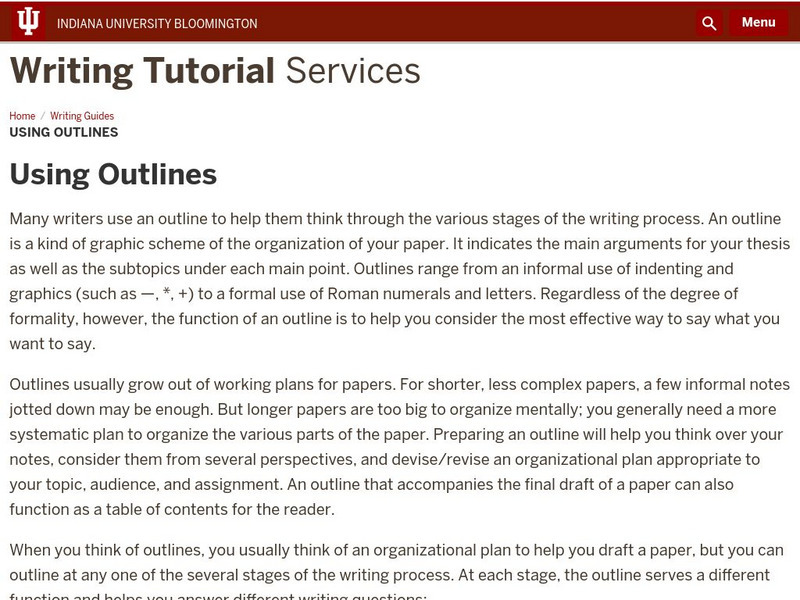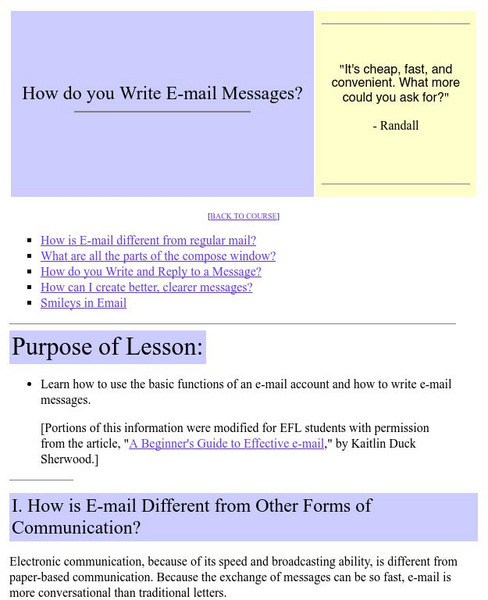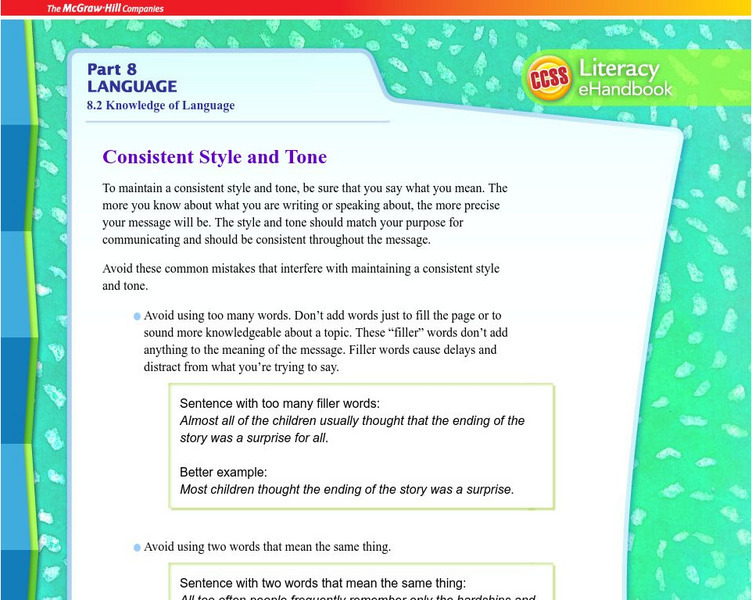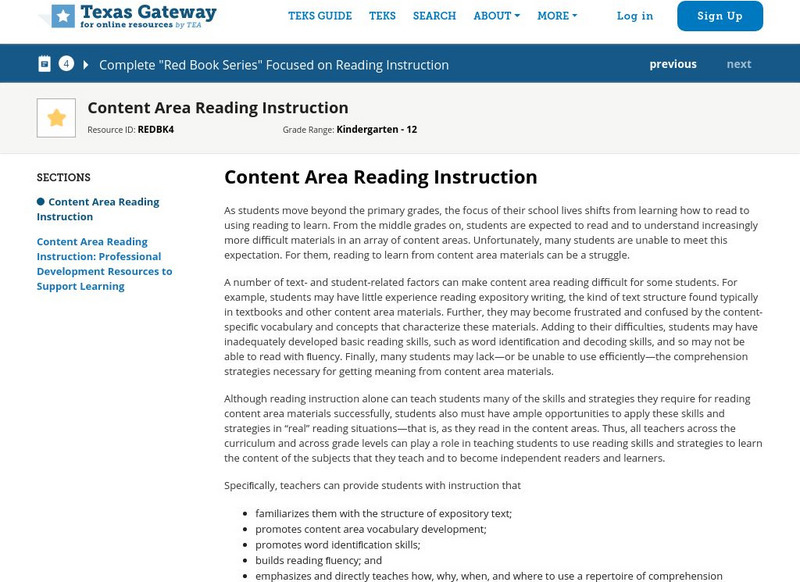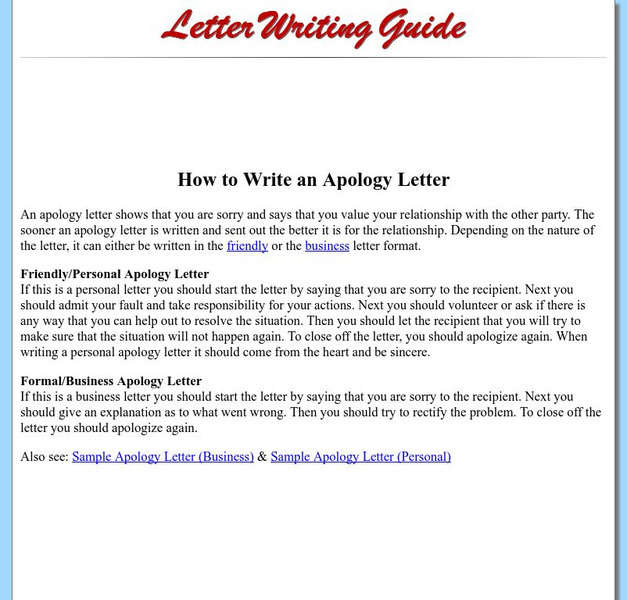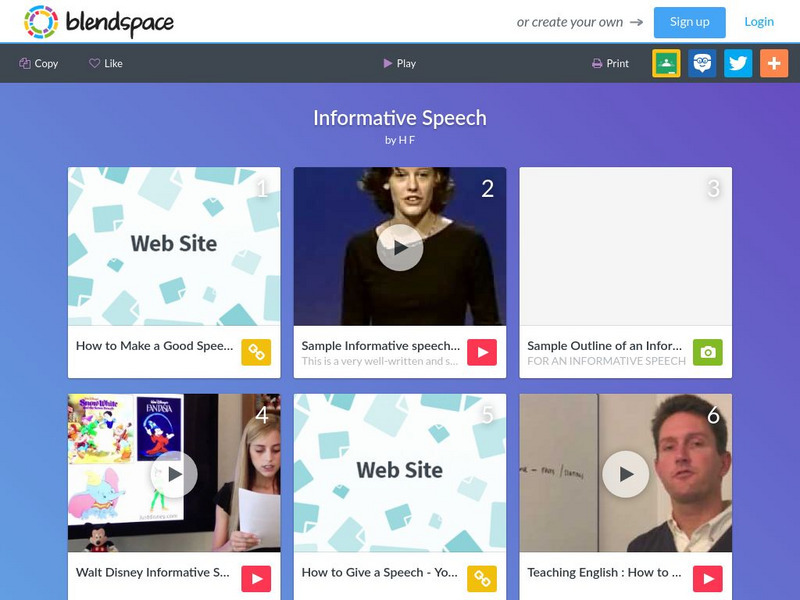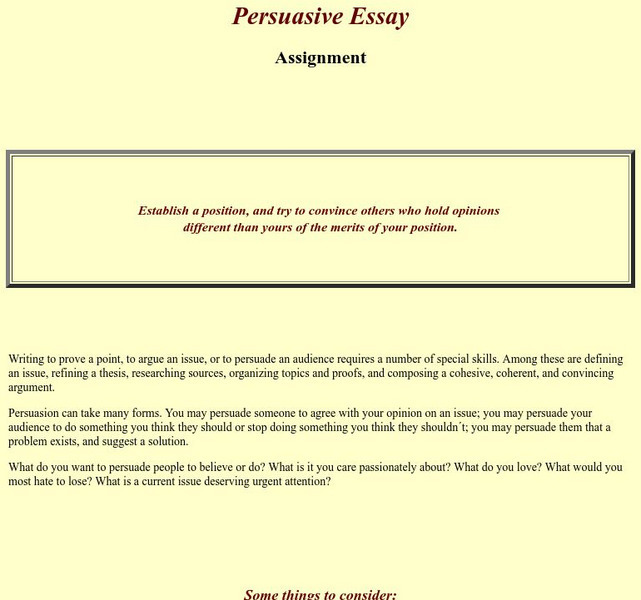Grammarly
Grammarly Blog: Anytime vs. Any Time
This page focuses on changes in language usage pertaining to "anytime" and "any time." In informal writing "anytime" can be used, but in formal writing "any time" is perferable. Examples are provided.
TES Global
Tes: Non Fiction Unit 4 Formal/impersonal Writing: Tourists
[Free Registration/Login Required] Students will analyze tourism brochures to determine features related to nonfiction writing in this unit. Tourism websites may be used in lieu of the brochures. Cotswold and the North Leigh Roman Villa...
Sophia Learning
Sophia: Paper Writing: Outlines
Show students how essential an outline is to writing a paper. This source provides explanations for writing an outline and information about how to create both formal and informal outlines.
Indiana University
Indiana University: Writing Guides: Using Outlines
Explains how outlines can be used at different stages in the writing project. Covers outlines developed during research, prewriting, and drafting. Also discusses the formal outline, which may be required with a finished paper. Gives...
Grammarly
Grammarly Handbook: Informalities
A list of style techniques (with examples) used to create an informal tone in a written piece.
Khan Academy
Khan Academy: Style and Technique
Use context to figure out how to use language appropriately--formality, irony, understatement, and overstatement.
BBC
Bbc Bitesize: Speaking and Listening: Standard English
Explains what standard English is and when it is used, the difference between formal and informal language, and non-standard forms of English such as those found in dialects.
Grammarly
Grammarly Blog: Consistent Point of View
This Grammarly Handbook resource reminds students how to write with a consistent point of view. Examples are provided to demonstrate how to fix a sentence that contains an inconsistent point of view.
National Health Museum
Access Excellence: Writing Hypotheses
This informative page describes the true purposes of the hypothesis and how it should be used. Not only shows how they are written, but also helps students figure out the dependent versus independent variable.
Randall Davis
Esl Net world.com: How Do You Write E Mail Messages?
This tutorial explains writing email messages in formal and informal style using Hotmail. It explains the steps taken in composing, replying to, and sending messages.
Curated OER
Macmillan/mc Graw Hill: Writing: Consistent Style and Tone
Learn about maintaining a consistent style and tone in writing.
CK-12 Foundation
Ck 12: 7.1: Tone and Style
[Free Registration/Login may be required to access all resource tools.] Gain a better understanding of tone and style by understanding formal and informal style, learning to write clearly, correcting vague sentences, distinguishing...
Texas Education Agency
Texas Gateway: Reading Instruction: Content Area Reading Instruction
This website offers a free download of the Research-Based Content Area Reading Instruction booklet. The purpose of this booklet is to provide teachers with research-based and classroom-tested information about each of these aspects of...
Letter Writing Guide
How to Write an Apology Letter
This informational site for teachers and students explains the importance of a letter of apology. Then the article articulates the types of information to include in friendly/personal apology letters and in formal/business apology letters.
BBC
Bbc Bitesize Revision: A Letter
Short tutorial about letter writing from a Scottish Standard Grade examination preparation site. Contains a page of information about personal letters and another about formal letters. This is followed by a five question interactive true...
Department of Defense
Do Dea: Conventions
Sharpen your use of the formal conventions of English with this self-guided learning module. The module focuses on formal and informal language, making pronouns agree with their antecedents, and common spelling and grammar errors. At the...
Sophia Learning
Sophia: Appropriate Language
This lesson focuses on using appropriate language in formal writing; it discusses pretentious language, jargon, and cliches. It defines each, provides examples, and explains why and how to avoid each. SL.9-10.6 Adapt to task/formal
Grammarly
Grammarly Blog: Anymore vs. Any More
This page explains the use of "anymore" in informal writing, but in formal writing and anywhere else, "any more" is preferable. Examples are provided.
Grammarly
Grammarly Blog: Capitalization:titles of Books, Articles, Songs
This page explains the rules for capitalizing titles: In informal writing all words may be capitalized, but in formal writing, articles, conjunctions, and prepositions are NOT capitalized unless they begin a sentence. Examples are provided.
TES Global
Blendspace: Informative Speech
A nine-part learning module with links to websites, videos, and images to use while learning how to write and deliver an informative speech.
AdLit
Ad lit.org: Engaging Family & Community in Afterschool and Summer Programs
Informal literacy experiences often serve to shape young people's identity as readers and writers as much as or more than formal schooling.Community and family support can emphasize the importance of reading and writing, build...
Other
English 100: Persuasive Essay
This tutorial provides writing instructions and ideas to help the student in preparing a persuasive essay.
Online Writing Lab at Purdue University
Purdue University Owl: Using Appropriate Language
Knowing the right language for your particular audience is a necessary skill for all writers. No one wants to offend their audience or appear as though they don't know their content. Learn these rules of thumb to become more familiar...
CPALMS
Cpalms: Calling All Kid Presidents
[Free Registration/Login Required] In this lesson, young scholars will watch a video of Kid President giving a speech and another of a student's winning speech to be vice-president of the student council. They will also read an excerpt...



